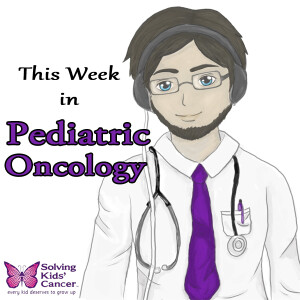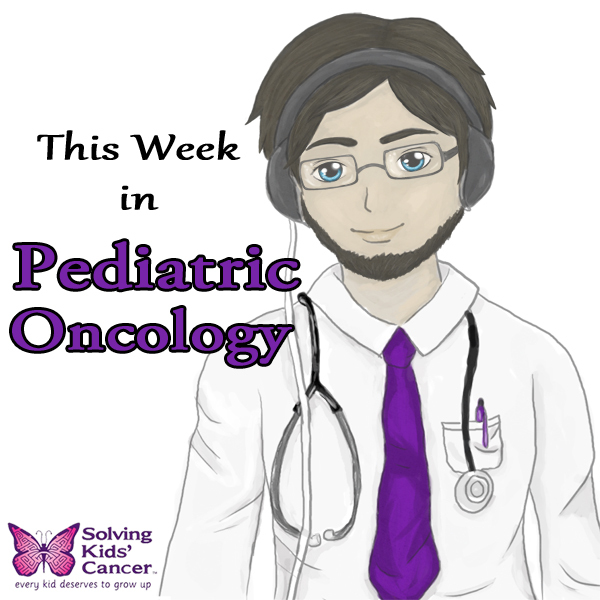Episodes

Monday Feb 10, 2014
Monday Feb 10, 2014
October
31, 2013
New York, NY—This Week in Pediatric Oncology
(TWiPO), the first podcast focusing on pediatric cancer research, announced
that Gavin Lindberg is a featured guest on its most recent episode, entitled
Effective Advocacy. In this episode, Mr. Lindberg speaks with host Dr. Tim Cripe
(Nationwide Children’s Hospital), and co-host Dr. Robyn Dennis (Nationwide
Children’s Hospital), about his work to increase funding for childhood cancer
research.
Mr. Lindberg is the President and Co-Founder of
The Evan’s Victory Against Neuroblastoma (EVAN) Foundation, which was
established in memory of his only child Evan Lindberg. Evan bravely battled
neuroblastoma for four years before passing away at the age of 7 in 2010. The
Foundation funds research aimed at fostering new therapies for children with
neuroblastoma, and sponsors patient-wellness programs for childhood cancer
patients enduring long and difficult stays in the hospital.
While his son was in treatment, Mr. Lindberg
served as the founding president of the Band of Parents, an organization that
raised over $1 million to develop a new humanized antibody for neuroblastoma
currently used at Memorial Sloan-Kettering Cancer Center, in New York City. Mr.
Lindberg and his wife Wendy also work to increase awareness of neuroblastoma
among policymakers in Washington, DC and have successfully advanced new
opportunities for federal support of neuroblastoma research within the
Department of Defense.

Monday Feb 10, 2014
Monday Feb 10, 2014
October
18, 2013
Eric Kodish, MD, is a featured guest on the
recent episode of This Week in Pediatric Oncology. In this episode, Dr. Kodish
speaks with host Dr. Tim Cripe (Nationwide Children’s Hospital), and co-host
Dr. Andy Kolb (AI DuPont), about informed consent and ethics surrounding
childhood cancer clinical trials.

Monday Feb 10, 2014
Monday Feb 10, 2014
October
03, 2013
Dr. Joseph Neglia (University of Minnesota) is
nationally and internationally recognized for his contributions to the field of
childhood cancer long-term effects. He is the featured guest in this week's
podcast episode, and answers questions from host Dr. Tim Cripe (Nationwide
Children’s Hospital), and co-hosts Dr. Robyn Dennis (Nationwide Children’s
Hospital), Dr. Andy Kolb (AI DuPont), and Donna Ludwinski (Solving Kids’
Cancer), about late effects and the risk of secondary cancers among childhood
cancer survivors.

Monday Feb 10, 2014
Monday Feb 10, 2014
September
19, 2013
Recently, several published papers have
discussed the risk of cancer among family members of children with
cancer. TWIPO host Dr. Timothy Cripe and fellow co-host Dr. Robyn Dennis
(Nationwide Children's) break down the topic of familial cancer risk with
certified genetic counselor Elizabeth Varga (Nationwide Children's) and Donna
Ludwinski (Solving Kids' Cancer) and what families should take away from these
studies.

Monday Feb 10, 2014
Monday Feb 10, 2014
September
05, 2013
New revelations in DNA damage and cell repair
mechanisms in childhood cancer may help scientists identify the underlying
cause of pediatric solid tumors and lead to the development of new therapies.
Dr. Peter Houghton (Nationwide Children's) speaks with TWIPO host Dr. Timothy
Cripe and fellow co-hosts Dr. Lionel Chow (Cincinatti Children's) and Dr. Robyn
Dennis (Nationwide Children's) about his recent paper published in the Proceedings
of the National Academy of Sciences on the mTOR pathway and role of
ATM.

Monday Feb 10, 2014
Monday Feb 10, 2014
August
15, 2013
TWIPO host Dr. Tim Cripe (Nationwide
Children's) and co-hosts speak with Vickie Buenger from Texas A&M
University about her role as a childhood cancer advocate. A founding member of
the Coalition Against Childhood Cancer, Buenger discusses the organization's
principles and future projects to bring the childhood cancer community
together.

Monday Feb 10, 2014
Monday Feb 10, 2014
August
01, 2013
In this new episode, host Dr. Tim Cripe
(Nationwide Children's) and co-host Dr. Jeffrey Auletta (Nationwide Children's)
interview Solving Kids' Cancer co-founder and Executive Director Scott Kennedy
and co-director of research programs Donna Ludwinski. Both Scott and Donna
share their personal stories that led them to Solving Kids' Cancer and their
shared passion to improve survival for children with the deadliest childhood
cancers through research advocacy.

Monday Feb 10, 2014
Monday Feb 10, 2014
May
07, 2012
In this interesting episode, host Dr. Tim Cripe
(Nationwide Children's) and co-hosts Dr. Lionel Chow (Cincinnati Children's),
Dr. Andy Kolb (AI DuPont), and Donna Ludwinski (Solving Kids' Cancer) quiz Dr
Paul Sondel and Dr. Ken DeSantes (both from University of Wisconsin - Madison)
on NK cells and the implications of KIR/KIR-ligand mismatch (killer
immunoglobulin-like receptor) with regard to immunotherapy treatment of
neuroblastoma.
References:
Delgado DC, Hank JA, Kolesar J, Lorentzen D, et
al. Genotypes of NK cell KIR receptors, their ligands, and Fcγ receptors in the
response of neuroblastoma patients to Hu14.18-IL2 immunotherapy. Cancer Res.
2010 Dec 1;70(23):9554-61. Epub 2010 Oct 8.
http://www.ncbi.nlm.nih.gov/pmc/articles/PMC2999644/
.
Venstrom JM, Zheng J, Noor N, Danis KE, et al.
KIR and HLA genotypes are associated with disease progression and survival
following autologous hematopoietic stem cell transplantation for high-risk
neuroblastoma. Clin Cancer Res. 2009 Dec 1;15(23):7330-4. Epub 2009 Nov 24.
http://www.ncbi.nlm.nih.gov/pmc/articles/PMC2788079/
.
Alderson KL, Sondel PM. Clinical cancer therapy
by NK cells via antibody-dependent cell-mediated cytotoxicity. J Biomed
Biotechnol. 2011;2011:379123. Epub 2011 May 24.
http://www.ncbi.nlm.nih.gov/pmc/articles/PMC3110303/

Monday Feb 10, 2014
Monday Feb 10, 2014
April
05, 2012
Host Dr. Tim Cripe welcomes back co-host Dr.
Lionel Chow to discuss somatic mutations in pediatric brain tumors. After
recapping the consensus paper on molecular subgroups in medulloblastoma
discussed in TWiPO episode 22 (Brain Tumor Round Robin) Dr Chow highlights the
significance of the driver mutations in histone H3.3 in pediatric glioblastoma.
Results of whole exome sequencing have shown that significantly more somatic
mutations are present in adult tumors compared to pediatric tumors. This
difference might suggest a reason for better success rates in pediatric tumors
and possibly more escape mechanisms in adult tumors. Dr. Chow also discusses a
paper published by the Pediatric Cancer Genome Project (a St. Jude Children's
Research Hospital–Washington University collaboration) on somatic histone H3
alterations in diffuse intrinsic pontine glioma (DIPG). The findings are
significant in showing that this mutation is present in 36% of non-brain stem
gliomas and in 78% of brain stem gliomas, but in none of the other pediatric
tumor types.
Please send comments and questions to
twipo@solvingkidscancer.org
Papers discussed:
Taylor MD, Northcott PA, Korshunov A, et al.
Molecular subgroups of medulloblastoma: the current consensus. Acta
Neuropathol. 2012 Apr;123(4):465-72. Epub 2011 Dec 2.http://www.ncbi.nlm.nih.gov/pmc/articles/PMC3306779/
Schwartzentruber J, Korshunov A, Liu XY, Jones
DT, et al. Driver mutations in histone H3.3 and chromatin remodelling genes in
paediatric glioblastoma. Nature. 2012 Jan 29;482(7384):226-31. doi:
10.1038/nature10833. http://www.ncbi.nlm.nih.gov/pubmed/22286061
Wu G, Broniscer A, McEachron TA, Lu C, Paugh
BS, et al. Somatic histone H3 alterations in pediatric diffuse intrinsic
pontine gliomas and non-brainstem glioblastomas. Nat Genet. 2012 Jan
29;44(3):251-3. doi: 10.1038/ng.1102. St. Jude Children's Research
Hospital–Washington University Pediatric Cancer Genome Project.http://www.ncbi.nlm.nih.gov/pubmed/22286216

Monday Feb 10, 2014
Monday Feb 10, 2014
March
06, 2012
Dr. Tim Cripe welcomes Dr. Andy Kolb from AI
DuPont in this episode of TWiPO, and special guest Dr. Andromachi Scaradavou,
the Medical Director of New York Blood Center's National Cord Blood Program.
NYBC is the world's oldest and largest public
cord blood bank, and collects, processes, tests and stores cord blood that
mothers donate shortly after birth. The cord blood is for children and adults
with no related donor available who need a hematopoietic stem cell transplant
for life-threatening illnesses. More than 60,000 units are stored at NYBC and
more than 4500 units have been provided for transplants worldwide. The variety
of ethic groups represented is much higher in cord blood banking than in bone
marrow donor programs. The percentage of use is climbing significantly for
pediatric transplants partly because of the small dose required.
Discussants cover many aspects of this
fascinating subject: background and uses of cord blood, logistics of
collecting, processing, storing, and selecting units for transplants, as well
as the advantages and challenges currently faced in this field. For more on
NYBC seehttp://www.nationalcordbloodprogram.org/
We welcome all questions or comments at
twipo@solvingkidscancer.org

